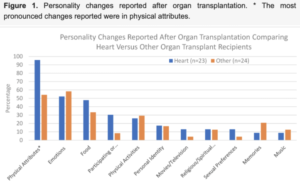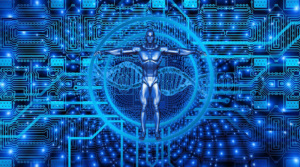Can biotechnology control human behavior?
Every now and then you come across a study that breaks new ground and advances people’s understanding. The journal Transplantology published a study called Personality Changes Associated with Organ Transplants, which documents the experiences of people who have received a range of donor organs, including hearts, kidneys, livers, and lungs.
It is known that heart transplant recipients can experience personality changes. This study shows that this is also the case with other types of organ transplants. Below is a summary of the spectrum of changes observed in the 47 study participants, broken down by heart transplant recipients and other organ recipients.

Overall, 87% of the subjects experienced significant unusual changes that challenged their behavior, sense of identity and personal preferences. First-hand accounts and evidence from donor families confirm that some of these effects are related to the transfer of personality traits such as food or behavioral preferences from the donor to the organ recipient.
This is an unexpected result that challenges conventional wisdom. The study shows that memory is distributed throughout physiology and is closely linked to a variety of organ systems, highlighting how little the life sciences know about the interface between consciousness and matter.
Previous speculation about the origin of these effects focused on three possible mechanisms – psychological conditioning, cellular biochemistry and electromagnetic fields. The results of the study clearly point to the importance of the biochemical mechanisms.
Psychological theories focus on the belief that certain words, thoughts, feelings, or repetitive behaviors imprint themselves on the world around us. These explanations are vague from a conventional scientific perspective and do not reveal why or how a whole range of organ systems might be involved in this process. Nevertheless, they point to the need to integrate our understanding of biochemistry and consciousness.
Previous speculative ideas about the transmission of transplant characteristics through electromagnetic fields were closely related to the electrical properties of the heart and are now obsolete since we know that the phenomenon also extends to other organs.
The third type of explanation concerns the possible storage of memories in cells, including their epigenetic, DNA, RNA or protein components. This hypothesis is not invalidated by the results of the current study. ScienceAlert even offers the “systemic memory hypothesis” as a possible explanation for the results of the new study. This hypothesis states that all living cells have a memory, which means that the past and thus future actions can be passed on via the tissue from the donor to the transplant.
The study also points to the interconnected nature of memory in our physiology. Transferred memories seem to be able, in some cases, to automatically integrate into the organ recipient’s behavioral preferences. Not to say, they even automatically take control of those behaviors and preferences.
In other words, it seems very likely that memories are somehow stored in cellular genetic/epigenetic systems that can exert some degree of control over aspects of human behavior and thought. If this is the case, there is a lot to unravel.
First, cellular genetic systems appear to be far more complex and perform more functions than biotechnology currently assumes. Our current models are too crude to capture the results of the transplantation studies. Cellular genetic functions interact closely with consciousness. Consciousness and body are two sides of the same coin in a very deep and fully integrated sense. This greatly underscores the understanding we expressed in the Hatchard Report and particularly at GLOBE that the simple current biotechnology models of intracellular functions are extremely incomplete, if not wrong in some very critical respects.
The implication is clear: biotechnological interventions that penetrate the cell membrane and introduce modified cellular genetic material (gene therapies, DNA and mRNA vaccines, function-enhancing viral material, etc.) are even riskier than previously imagined. They could alter what makes us human.
Second, and even more disturbing, it appears that genetic information or sequences have the ability to take control of human behavior. Clearly, our memories play a very important role in shaping behavior; what occurred in the past has an overwhelming influence on our future.
It is only a small step to realize that gene editing, including any kind of editing of the chain of genetic functions within cells, could more or less automatically alter our behavior and psychological profile. And more importantly, since our knowledge of cellular genetics still seems very incomplete, cellular gene editing, if done on a scale appropriate to the size of the organ, could mess up our behavior, thinking, and understanding. It could even do so against our will. In other words, it could greatly confuse and stress us, or even control us.

You will not have missed the fact that a genetically modified covid virus and/or the mRNA vaccines are candidates for this. It is estimated that up to ten billion covid virions are present during a covid infection. Each covid shot contains trillions of mRNA molecules that alter the genetic function of billions of cells. A human liver contains about 240 billion cells, a kidney much less. So both the covid infection and the mRNA vaccine technology are capable of influencing our psychological and behavioral profile. Even the New York Times has pointed out the widespread disruption of social organization, high crime and conflict rates during the pandemic.
It is only a small step to realize that it might be possible for a culture with more sophisticated scientific knowledge than we currently have to genetically control the consciousness and behavior of entire populations. A frightening thought.
We are not proposing anything illogical or unscientific here. There are parallels with early 20th century physics. Faced with indisputable experimental results, physicists had to build the notion of a conscious observer into the heart of quantum mechanics. Biotechnology is irrevocably being pushed to the admission that consciousness is at the heart of biology and the pinnacle of evolution. This is not a radical idea, but our simple everyday experience as people, which should have an important place in the life sciences.
In conclusion, I would like to make it clear that the new transplantation paper significantly reinforces GLOBE‘s call for global legislation banning biotechnological experiments. Any step towards changing the internal workings of cells is a step in the wrong direction and a great risk for all of humanity.
Biotechnology experiments should be banned. It is a step too far, and yet a step that millions of workers funded by governments, mega-corporations and private investors take carelessly every day. The risks are incalculable and terrible consequences inevitable.
We cannot leave you alone with this prospect without pointing out some steps that each person can take to protect their health. All of these systems can be supported by simple additions to our daily routines and lifestyle.
Chemistry: The food we eat needs to be free of ultra-processed ingredients, pesticides, etc., it should be lighter and more varied and based on genuine natural food sources that contain DNA. These measures will support cellular chemistry.
Water and electricity: To improve hydration, drink hot purified water during the day. To facilitate this, you can have a thermos nearby. This will also improve electrical conductivity in the physiology.
Electric fields: Take a walk in the morning sun every day. The sun is a form of electromagnetic radiation that has healing properties. Avoid excessive exposure to cell phone, electronic and wifi radiation.
Shapes: Hatha yoga practice brings the body into shapes that promote health and renew energy. The layout, proportions, orientation and materials of your home have a major impact on your health.
Vibrations: Uplifting music makes the physiology vibrate in tune with the cosmic harmonies. Simple breathing exercises in clean air clears the consciousness.
Transcription Precept: Always speak the truth. This ensures that our thinking is in harmony with natural law and protects our intelligence along with the intelligence of our body.
Genetic Identity: Meditate and honor your traditional cultural knowledge as it enhances immunity, humanity, and the expression of our personal and collective genetic heritage.
Author: Guy Hatchard
yogaesoteric
June 17, 2024
